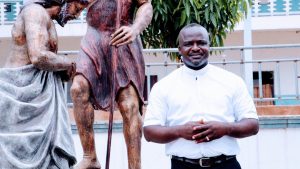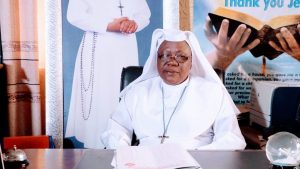Catholic priests who, as Principals and Administrators, run secondary schools within the Onitsha Ecclesiastical Province in Anambra State have explained why mission schools in the state would always outperform others in internal and external examinations.
The majority of them who spoke during Prime Business Africa’s four-day tour of mission schools in the area, said emphasis on technology and quality of teachers has remained the basis for success in mission schools run by the Church.
READ ALSO: Tech-savvy Priests Running Top-notch Schools In Anambra
Join our WhatsApp ChannelCatholic Mission schools in Anambra State, and Onitsha in particular, have, in the last 12 years, helped in bolstering the State’s position as high flyer in virtually all external examinations, including the West African Examination Council’s (WAEC) Senior Secondary School Certificate Examination (SSCE) and the Joint Admission and Matriculation Board’s (JAMB) UTME.
As many testified, the vision of the Archbishop of Onitsha Catholic Diocese, His Grace Most Rev. Valerian Maduka Okeke in pushing for return of mission schools to churches by the Anambra State government paid off, as success stories in infrastructure, academic excellence and good moral formation of students abound 12 years after.
READ ALSO: ARCHBISHOP OKEKE: Anambra Mission Schools Now Role Models For Excellence, Discipline
Prompted by the success stories in the mission schools under the Catholic Archdiocese of Onitsha, Prime Business Africa paid a visit to the schools to see things, Our correspondents also spoke to major stakeholders.
In an exclusive interview, Secretary of the Onitsha Archdiocesan Education Commission, Rev. Fr. Dr. Paschal Onwugbelu said as far as the Church is concerned, the idea of education is not merely to pass examinations, but for the education experience to become a source of enlightenment and holistic formation to young people.

Dr. Onwugbelu, an educational administrator, stated that the diocese has a policy of integrating ICT courses in the school curriculum to enable students acquire digital knowledge outside of their conventional subjects at basic education level and be able to compete favourably with their peers from different parts of the world. The Archdiocese, according to him, has a deliberate policy of using ICT to drive education.
“ICT is always a very debatable topic in education, because people make a distinction between having technology in the classroom and having it drive education. You will find out that much emphasis is put on having technology in the classroom. It doesn’t impact on academic achievements of students.
In the Archdiocese of Onitsha, we are much more interested in having technology drive education. The way we do it is: Firstly, not to displace the human beings, the teachers in the classrooms, but how it can support and make more efficient the instruction delivery by teachers that we have. Secondly, how can it enhance academic achievement? For you to talk about academic achievements, you have to talk about the interest, motivation and engagement of the students.”
Onwugbelu disclosed that the diocese spends over N10 million annually on scholarships for students to help increase access to education for people at basic and tertiary education levels in line with the Church’s idea of charity and mission of holistic human development.
He said: “In all our schools, we have a standing scholarship instituted by the Archbishop waiting for anybody to grab. If a student makes full straight ‘A’s in SSCE, the person has full scholarship in any Nigerian university. If one is going outside for studies there is provision for flight ticket and pocket money from the Archdiocese of Onitsha. Such is to encourage students to even do more, and achieve outstanding results and be a beacon of light shining for others to see.
“If one calculates the number of scholarships that the Archbishop has rolled out every year in the Archdiocese’s owned primary and secondary schools, they can be in the excess of N10 million and more. That’s not all. The Archbishop is currently training over 16 students at Veritas University.”
He stated that for effective management of mission schools returned to the Church, the Archdiocese also sends priests abroad to learn about education system management. Some of them he said, have returned after completing their studies and were appointed as principals and managers of some of those mission schools.
He added that currently, many priests from the diocese are studying in various countries, especially Europe and America, after which they would return to contribute to making the education system more efficient.
“The Archbishop has so far trained about 14 priests in four countries in education-related courses. One in Canada, Nigeria, four in the United States of America, and the rest in England; and more are coming. We have about eight fully engaged in education apostolate, and others are contributing from where they are through giving seminars, professional development and policy inputs.
Apart from primary and secondary school, the Archdiocese also has projects in tertiary education as it has built the college of nursing in Onitsha for training of healthcare professionals; and currently building the Shanahan University in Anambra State to help in harnessing the pool of potential talents in Southeast and be able to drive industries in the region.
He said some of those priests being trained abroad would later come back and become part of the workforce in the Shanahan University now under construction.
Also, in a chat with Prime Business Africa, the Director, Social Communication Commission, Onitsha Catholic Archdiocese, Rev. Fr. George Adimike who thanked the Anambra State government for returning mission schools to the churches, said due to the success stories recorded so far, the policy is now being emulated by other states.
Visit To Some Mission Schools
Prime Business Africa visited some of the mission schools and interacted with the clergy on how they are managing the schools; and also the students about their experiences. Some of them visited include Christ the King College (CKC) Onitsha, Regina Pacis Model Secondary School, Onitsha, Queen of Rosary College Onitsha, St. Charles College, Onitsha, St. Kizito Girls Secondary School, Umudioka, Mater Amabilis Secondary School, Umuoji, St. John’s Special Science & Technical College, Alor and Stella Maris College, Umueri.
Principal of CKC, Rev. Fr. Dr. Celestine Okafor said the school has through the effort of the Archdiocese and the Old Boys received great facelift since it was returned to the church by government.
The school which was officially established in the year 1933 by the Irish missionaries, has produced many illustrious alumni such as Prof. Pat Utomi, Anambra former governors Peter Obi, and Willie Obiano, Olisa Agbakoba, and many more.
“Here in CKC we teach emotional intelligence. I don’t know how many schools in Nigeria where you can go and get thought about emotional intelligence.”

Speaking generally on the issue of human capital in mission schools, Fr. Okafor said, “We have an assemblage of qualified personnel manning the schools. When you have people like this manning the schools, it’s not just about the infrastructure, there is also the human capital development.”
The school began as a social centre in 1962, for skill acquisition, but transformed into a model secondary school in 1966.
“The school so far has been known for academic excellence, abundant moral probity, social and intellectual reformation.
“In the area of ICT, we have tried our best to stick to the positive trend. Presently, we offer robotics, coding; we also work in the light of programming, App management, Artificial Intelligence, and other ICT skills to students from their second year, that is, JS 2,” Fr. Obiekezie revealed.
He said the school took first position in the junior category of AVOSCO Competition organised by the Archdiocese for secondary schools.
The clergy also disclosed that the school plan to delve into more scientific skills, textile, crocheting, and other vital skills for human and economic empowerment.
At Regina Pacis, the director, Rev. Fr. Jerome Obiekezie, said that aside the basic education curriculum, the school also offers ICT skills like robotics, computer coding and programming, Artificial Intelligence, and App Management to the students who start learning them from second year.

The school it would be recalled had five of its students win top position in Junior Division Finalists at the 2018 Technovation World Pitch Summit in San Francisco, USA. They competed with students from the United States of America, Turkey, Uzbekistan, Spain and China, with over 2000 apps submitted for the Competition. The team codenamed ‘Save A Soul’, developed a mobile application called ‘FD-Detector’ to tackle the problem of fake pharmaceutical products in Nigeria by leveraging a drug’s barcode to verify its authenticity and expiry date.
Principal of St. John’s Special Science & Technical College, Alor, Rev. Fr. Francis Unegbu said the diocese’s intervention in education projects in the state, has helped in the moral rectitude of the students, coupled with the massive renovation of the school’s structures which had been in a highly dilapidated state.

He said there has been significant improvement in the students’ academic performance for over the past five years with zero tolerance for exam malpractice. He thanked the church for her intervention in terms of mobilizing funds and human capital for the school.
“Our schools are globally competitive. Wherever you place students we train for competition, they don’t run away. They are comfortable competing with their mates all over the world,” Fr. Unegbu stated.
The school which is for only boys, has according to the principal over 1000 students currently, with more coming in.
During the interview, Prime Business Africa observed a group of parents who came to the school to obtain entrance forms for their wards. “Fr keep up what you are doing in this school,” one of the parents said.
At St. Kizito Girls, Umudioka, Prime Business Africa observed the massive structural transformation of the school. Prime Business Africa learnt that due to improvement in the quality of teaching and learning in the school, the students come from different parts of the country and abroad. Nigerians living abroad who want their children to have secondary school education in a Nigerian cultural setting, send their wards to the school.

The school which started in 1966, is according to the director, Rev. Fr. Damian Chinedu Ojukwu, operating with the watch word “diligence for excellence in whatever we do.”
He said the school’s transformation started immediately after it was returned to the church by the government in 2010.
“The intervention of the Archdiocese through the Archbishop has changed our mentality in the way we approach issues of education in Anambra State and in the entire country. People now look up to Anambra State and see the tremendous efforts we are putting in education. Some states in Nigeria have started toeing the line of Anambra State in returning schools established by christian missionaries to churches because they have seen the great impact the church is creating in terms of education,” Fr. Ojukwu noted.
Similarly, Rev. Sister Maria Chijioke Nwankwo, principal of Queen of the Rosary College, Onitsha one of the returned schools, observed that the concept of education as a tool of formation in terms of morals and academics in the state changed significantly since the return.

“The students now are being formed to realised that they are all created for something.”
“In QRC, the children are being groomed to maintain high moral standards and academic excellence where they will be fulfilled and contribute their own quota for changing the society for better,” Sis. Nwankwo averred.
QRC is a girls’ school established on October 7, 1942 and has according to the principal had records of excellent performance in academics and extracurricular activities like games competitions both within and outside the state.
Also speaking with Prime Business Africa, the principal of Mater Amabilis Secondary School, Umuoji, Rev. Fr. Francis Onwuchulu, revealed that products of the school so far has an edge over their counterparts due to quality eduction and vocational skills they acquire.

According to him, the girls’ boarding school which was founded in 1962, recorded third best secondary school in Nigeria in 2018.
The Onitsha Catholic Archdiocese also organises an annual competition called Archbishop Valerian Okeke Science Competition (AVOSCO) for secondary schools within the Archdiocese to encourage hard work and academic excellence. Winners of the Competition are usually given prizes.



















Follow Us